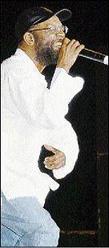Mel Cooke, Freelance Writer

Beres Hammond - File
Just as Beres Hammond hits a golden patch in reggae with One Dance, She Loves Me Now and Settling Down, the harsh reality of perceived prosperity hit. We pick up on his story in 1987, just after he was robbed, an incident that had a devastating effect on the singer and producer.
After Beres Hammond was robbed in 1987 he took time to settle down and he says "part of the settling took place in New York, Florida".
The recovery process "took about two, three years".
He questioned just what he had done for that to have happened to him. "It took some time to come up with the answer. And it took me back to square one, because I did not do anything," he said.
Hammond left the music business for three years, not doing any writing, recording or performing, as "me just chill and search meself".
When he returned to Jamaica for good in 1990, he had not been forgotten. He explains that "to me a song is a serious part of life. It also makes life, if you ask me. You can talk garbage and you know garbage is disposed of. Or you can say nice things that live on in people's lives. A lot of songs I did were like that. They affected people's lives in a nice way, a positive way".
Keeping beres alive
"Based on that my songs were still being played. I give thanks to all the radio stations for keeping Beres alive in my absence," he said.
And there was no rust, as Hammond says "my thing them just come anytime me walk through a studio door. That's when all hell or all heaven come tumbling down".
When he came back to Jamaica it was the latter that happened, as Hammond said "first tune I did when I came was a little song for Donovan Germaine (of Penthouse Records) called Tempted To Touch. Then I did another song for him". And Hammond breaks into song with "thought I could live without you ...". Of course, on the remake Buju Banton chanted "who sey day big man don't cry", beginning one of the more noted singer-deejay collaborations in Jamaican music, the two combining consistently on record and occasionally on stage.
After the drought
"Beres come at that time. Everything I touch," Hammond said, naming Putting Up Resistance and Full Attention among the songs that hit it big during that fertile period after the drought.
"It goes on and on. Is like the father smile on me again. From that time me no turn back," he said.
Nearly 20 years after courting international labels scared a young Beres Hammond into rural retreat, he did the album In Control for Elektra in 1994, No Disturb Sign, Giving Thanks and I Could Beat Myself among the cuts on the 14-track set.
But self-reliance and indepen-dence was always on his mind, and Hammond says "I decided to set up my business properly". At about the same time "the management lady came and did some good work - and is still doing some good work", he said of Mervis Walsh.
Next: The final chapter. Beres Hammond speaks of his upcoming album and how he feels about a lifetime in music.

